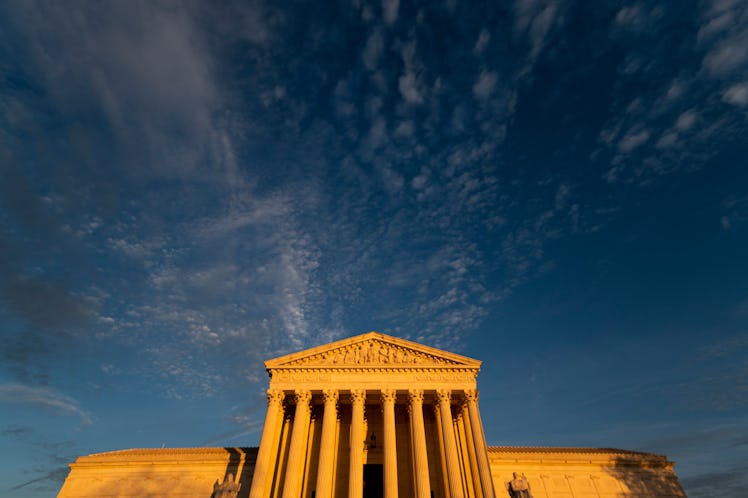
Great, Affirmative Action May Be At Risk At The Supreme Court
Just add it to the list of nerve-wracking court cases.
As is there wasn’t already enough going on with the Supreme Court, here’s one more thing to put on your radar. On Jan. 24, the Supreme Court announced it will hear two cases challenging affirmative action policies for college admissions, and it could be a big deal for college students. Here’s what you should know about the two cases.
The two separate cases were filed by the Students for Fair Admissions group at Harvard, a private institution, and the University of North Carolina (UNC), a public university. Per The New York Times, Students for Fair Admissions is a national organization backed by Edward Blum of Maine, a longtime opponent of affirmative action. These groups allege Harvard’s affirmative action policies discriminate against Asian American students by using subjective, non-academic admissions standards, as well as by setting “an informal ceiling on Asian-American enrollment,” per the complaint. Meanwhile, the complaint against UNC’s policies allege the school discriminated against both Asian American and white students by giving racial preference to Black, Hispanic, and Native American students.
Harvard lawyers responded to the allegations in a May 2021 brief, stating “under established precedent, to achieve the educational benefits that flow from student-body diversity, universities may consider race as one factor among many in a full, individualized evaluation of each applicant’s background, experiences, and potential contributions to campus life.” UNC representatives also responded in a March 2019 brief, asserting their “individualized and holistic admissions process closely follows Supreme Court guidance.”
Although both universities previously won their cases in federal trial courts, with Harvard receiving affirmation from a federal appeals court, the Supreme Court has still agreed to take up both cases — perhaps because of the “differing legal regimes that apply to the two schools,” per The New York Times. As a public university, UNC must satisfy the Constitution’s equal protection clause when admitting students, while Harvard is obliged to respect a federal statute banning racial discrimination in admissions practices to continue receiving government funds.
Affirmative action policies in college admission practices means schools are allowed to consider race as a factor when admitting new students, as long as it’s intended to promote diversity in the student body and is only used as one factor in an overall view of a student’s application. The purpose is to give historically underrepresented groups a fairer shot at admission, and also to ensure a diverse community for the benefit of all students. However, it’s (clearly) controversial: In 2022, nine states have laws banning race-based affirmative action, including California, Washington, Florida, Michigan, Nebraska, Arizona, New Hampshire, Oklahoma, and Idaho.
This is far from the first time the Supreme Court has reckoned with lawsuits challenging affirmative action in higher education. In the past, affirmative action has been consistently affirmed by the Supreme Court in cases such as Regents of the University of California v. Bakke, Grutter v. Bollinger, and most recently in the 2016 case, Fisher v. The University of Texas at Austin. In this most recent case, the court upheld the school’s admissions practices, ruling that officials could continue to consider race to ensure a diverse student body. “Considerable deference is owed to a university in defining those intangible characteristics, like student body diversity, that are central to its identity and educational mission.” Justice Anthony Kennedy wrote in the majority opinion. “It remains an enduring challenge to our nation’s education system to reconcile the pursuit of diversity with the constitutional promise of equal treatment and dignity.”
However, there have been a few big changes in the court since their 2016 ruling on the matter, and their names are Neil Gorsuch, Brett Kavanaugh, and Amy Coney Barrett. These three conservative justices, appointed by former President Donald Trump, have tilted the court far further rightward than its makeup in 2016. At the very least, some people expect the conservative-leaning court to meet current affirmative action policies with skepticism. Oral arguments on the two cases are expected to be heard during the court’s October 2022 session.